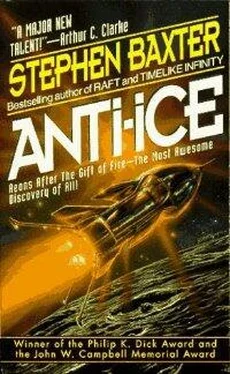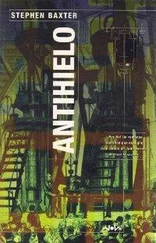Therefore I was more than happy when my facility with languages won me an assignment to attend the opening of the New Great Exhibition.
Spiers stood over my ink-stained desk, his gin-blown cheeks aquiver and his sad little walrus moustache working over his mouth. “You’re to be attached to the Prussian party,” he said. “Old Bismarck himself will attend, I’m told.”
I could sense an envious stirring among the fellows at their desks. To rub shoulders with Prince Otto von Schцnhausen Bismarck, the Iron Chancellor of Prussia—who not four years earlier had given the armies of old Franz Joseph of Austria a damn good licking in under two months… Said Spiers, “The Prussians will be traveling by Light Rail to the Belgian ports, and then by fast packet to Dover. You’ll be in the party to meet them when they land.”
“Sir, why such a circuitous route? The Light Rail from Calais is much faster—”
He eyed me bleakly. “Vicars, every time I think I’ve underestimated you, you come through again. Because of the situation between Prussia and France, boy. Don’t you read the newspapers? For God’s sake don’t talk to Bismarck or you’ll start another blessed war…” And so on.
In any event, I packed up my desk with a light heart and set off for Dover. The Prussian delegation traveled from that port by Light Rail to London; the Rail company had provided a carriage especially decorated with the arms of the Prussian King William, and the Prussian eagle flew on pennants at each corner. A fine sight we must have made as we soared along our single rail at fifty miles per hour a hundred feet above the rolling Kent countryside!
The party dined in the Imperial Embassy off St. James’s Square, and a grand affair it was too. The dozen Prussians in their grand uniforms, their chests ablaze with medals, looked like a row of aging peacocks. I in my new cummerbund, the most junior of our party and utterly unbemedalled, felt tongue-tied; but once the wine and other liqueurs worked their spell my spirit seemed to expand to fill the airy, ornate spaces of His Excellency’s dining room. I toyed with silver cutlery and savored the aroma of a brandy that had been casked before Napoleon was a boy, and my world of ink-stained desks seemed as far away as the Little Moon. At last, I fancied, I knew why I had joined the diplomatic service.
As the evening wore on Bismarck himself took rather a liking to me. Otto von Bismarck was a rotund, rather grandfatherly gentleman; and to him I was “Herr Vicars, my polite host.” I smiled glassily and sought topics of conversation. Bismarck ate heartily but would drink only a foul- smelling Germanic beer from a great lidded tankard; I fancied that he strained the worst elements of the brew through his impressive moustache. The beer, Bismarck whispered to me in his halting English, helped him to forget the complexities of his life at the court of King William, and to fall into sleep each night.
On the morning of the eighteenth we rose early. The Little Moon was still visible in the dawn sky, a fist of light tracking steadily toward the horizon. We caught the Light out of Euston for Manchester Piccadilly, and thence made our way by hansom to Peel Park, at the north of the city. By noon we had joined the procession of dignitaries approaching the vast gates of the Crystal Cathedral which had been erected in the Park. Even Bismarck, Colossus of Europe, became just another face in the crowd; and I was amused—and impressed—to see the Prussian’s round jaw grow slack as we neared this newest symbol of British ingenuity.
Like the first Crystal Palace—which had been erected in Hyde Park to house the Great Exhibition of 1851—the Cathedral was a monument of iron and glass designed by Sir Joseph Paxton. Laid out in Gothic cruciform style, its walls towered above us with the July sunlight blazing from a thousand panes. A Light Rail link soared from the east on graceful pylons and entered the building through an arched portal perhaps a hundred feet above the ground. Over the Cathedral’s entrance stood a spire five hundred feet tall; its distant tip, sporting a bravely fluttering Union flag, seemed to scrape the light clouds.
I barely heard my colleagues’ steady murmur of explanations to the awestruck Prussian delegation: “With over fifty acres of glass—twice as much as the Crystal Palace of ’51—and with a hundred thousand companies exhibiting (double the number of Paris in 1867) this fair will truly be an Exhibition of the Works of Industry of All Nations; as well as a fitting celebration of Manchester’s new status: Manchester and the North of England, workshop and capital of Britain and the Empire… the organizers anticipate ten million visitors in all—a hundred thousand this first day alone…”
We entered the building. I stood in that vast, hushed space; the clear glass roof seemed so high that clouds might form beneath it, and the iron frame of Sir Joseph’s construction seemed fairy-light, surely incapable of bearing such a weight of glass. The overall impression was something of that of a great glasshouse—but with none of the heat of the glasshouse; in fact the air inside the building was pleasantly cool, thanks to twenty great fans set high in the walls and powered, I was given to understand, by anti-ice steam turbines.
The babble of excited voices that carpeted the building seemed confined to the few feet of atmosphere just above my head, as if the vast volume of air reduced human activities to insignificance. The Light Rail link swept across that great space without visible means of support, terminating in a small platform built into the inside of the wall; a Mechanical Staircase carried passengers from the platform to the ground.
A high dais had been set up at the far end of the building; already it bore an array of grand-looking gentlemen in frock coats and toppers—not to mention a full orchestra and a thousand choristers. Kings, Chancellors and Presidents formed into rows meekly before the dais. I led my party of Prussians to positions delineated by red ropes borne on brass poles. I stood in my place patiently, gloved hands folded before me; and, looking down, I was astonished to observe that the Cathedral’s entire floor area had been carpeted with a thick red weave.
“It is indeed an expensive occasion.”
I looked to my left, startled—and found myself gazing into a pair of female eyes, ice-blue and sharply humorous, set in a china face.
I essayed a stammered reply.
“Excuse me,” she said tolerantly. “I caught you peeking at the acreage of carpet. I, too, was impressed.” She smiled at me—and it was as if the sun had come out. My new conversant was perhaps twenty-five; she wore a small-bustled, elegant dress of a pale blue velvet which offset her eyes perfectly; her night-dark hair was restrained into a simple bun, although curls straggled endearingly about her fringe. About her neck she wore a choker of black velvet, and that neck, a sculpture in pale flesh, led my eyes smoothly down to creamy pools of skin—
And I, prize chump, was staring unforgivably. I was vaguely aware of a young man beyond her, a swarthy, slim specimen who watched me suspiciously. “Forgive me,” I stammered at last. “My name is Vicars; Ned Vicars.”
She proffered a small gloved hand; I held it gently. “I am Françoise Michelet.”
“Ah—” Her accent was faint but unmistakable; “peeking” had sounded like “picking,” with the soft intonation of the southern Gallic provinces, perhaps of Marseilles. “You are French, mam’selle.”
“You should be in your Foreign Office,” she said drily.
“I am,” I replied like a fool—and then grinned at myself as I worked out her joke. “I am on duty here, I fear.”
“There are duties more onerous, I am sure.”
Читать дальше












